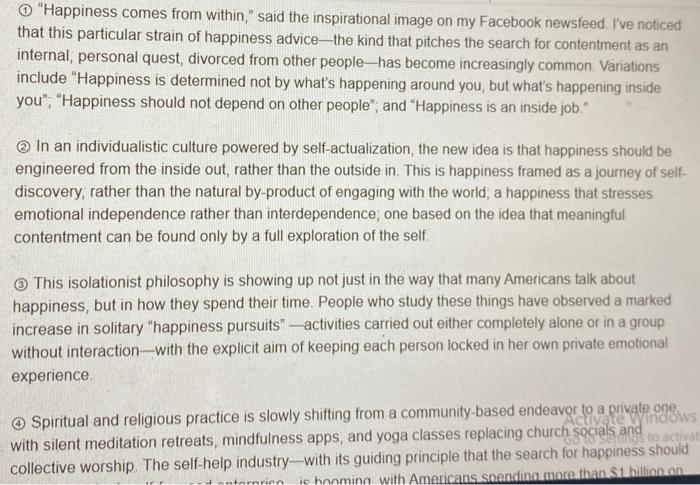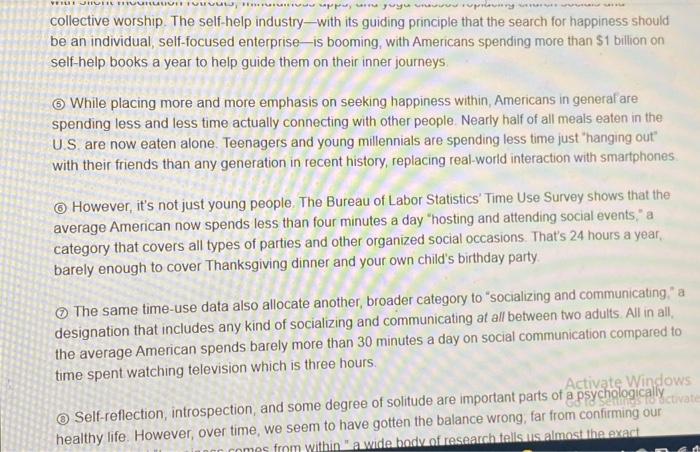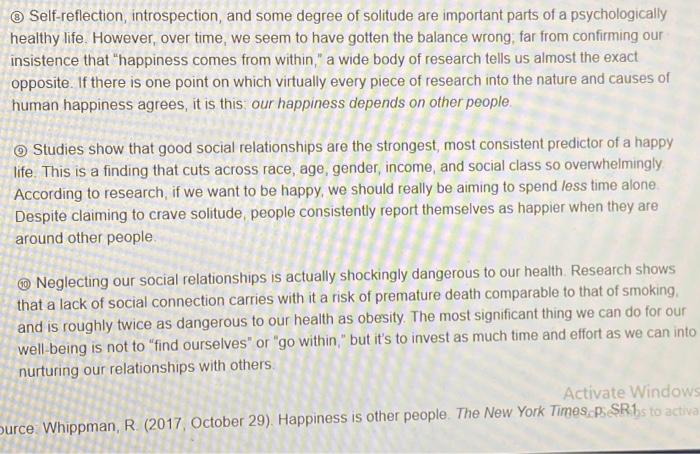PLEASE AS QUICK AS POSSIBLEE!!
Summarize :
150-200 words
20-25% of information to the summary
paraphrase and be objective no personal opinions.

O "Happiness comes from within," said the inspirational image on my Facebook newsfeed. I've noticed that this particular strain of happiness advice-the kind that pitches the search for contentment as an internal, personal quest, divorced from other people-has become increasingly common Variations include "Happiness is determined not by what's happening around you, but what's happening inside you", "Happiness should not depend on other people", and "Happiness is an inside job." In an individualistic culture powered by self-actualization, the new idea is that happiness should be engineered from the inside out, rather than the outside in. This is happiness framed as a journey of self- discovery, rather than the natural by-product of engaging with the world, a happiness that stresses emotional independence rather than interdependence, one based on the idea that meaningful contentment can be found only by a full exploration of the self This isolationist philosophy is showing up not just in the way that many Americans talk about happiness, but in how they spend their time. People who study these things have observed a marked increase in solitary "happiness pursuits" activities carried out either completely alone or in a group without interaction-with the explicit aim of keeping each person tocked in her own private emotional experience Spiritual and religious practice is slowly shifting from a community-based endeavor to a private one Activate Windows with silent meditation retreats, mindfulness apps, and yoga classes replacing church socials and ng to activat collective worship. The self-help industry-with its guiding principle that the search for happiness should ie hooming with Americans spending more than $1 billion on NA VETURIU FLUVITTUVUDP yuyu www.openvy collective worship. The self-help industry-with its guiding principle that the search for happiness should be an individual, self-focused enterprise-is booming, with Americans spending more than $1 billion on self-help books a year to help guide them on their inner journeys While placing more and more emphasis on seeking happiness within Americans in general are spending less and less time actually connecting with other people Nearly half of all meals eaten in the U.S are now eaten alone. Teenagers and young millennials are spending less time just hanging out" with their friends than any generation in recent history, replacing real-world interaction with smartphones However, it's not just young people. The Bureau of Labor Statistics' Time Use Survey shows that the average American now spends less than four minutes a day "hosting and attending social events, a category that covers all types of parties and other organized social occasions. That's 24 hours a year, barely enough to cover Thanksgiving dinner and your own child's birthday party The same time-use data also allocate another, broader category to socializing and communicating,"a designation that includes any kind of socializing and communicating at all between two adults. All in all, the average American spends barely more than 30 minutes a day on social communication compared to time spent watching television which is three hours. Activate Windows Self-reflection, introspection, and some degree of solitude are important parts of a psychologically octivat healthy life. However, over time, we seem to have gotten the balance wrong, far from confirming our comes from within a wide body of research tells us almost the exact Self-reflection, introspection, and some degree of solitude are important parts of a psychologically healthy life. However, over time, we seem to have gotten the balance wrong, far from confirming our insistence that "happiness comes from within," a wide body of research tells us almost the exact opposite. If there is one point on which virtually every piece of research into the nature and causes of human happiness agrees, it is this our happiness depends on other people. Studies show that good social relationships are the strongest, most consistent predictor of a happy life. This is a finding that cuts across race, age, gender, income, and social class so overwhelmingly According to research, if we want to be happy, we should really be aiming to spend less time alone Despite claiming to crave solitude people consistently report themselves as happier when they are around other people Neglecting our social relationships is actually shockingly dangerous to our health Research shows that a lack of social connection carries with it a risk of premature death comparable to that of smoking, and is roughly twice as dangerous to our health as obesity. The most significant thing we can do for our well-being is not to "find ourselves" or "go within" but it's to invest as much time and effort as we can into nurturing our relationships with others Activate Windows urce Whippman, R. (2017 October 29). Happiness is other people. The New York Times PSR 1s to activa O "Happiness comes from within," said the inspirational image on my Facebook newsfeed. I've noticed that this particular strain of happiness advice-the kind that pitches the search for contentment as an internal, personal quest, divorced from other people-has become increasingly common Variations include "Happiness is determined not by what's happening around you, but what's happening inside you", "Happiness should not depend on other people", and "Happiness is an inside job." In an individualistic culture powered by self-actualization, the new idea is that happiness should be engineered from the inside out, rather than the outside in. This is happiness framed as a journey of self- discovery, rather than the natural by-product of engaging with the world, a happiness that stresses emotional independence rather than interdependence, one based on the idea that meaningful contentment can be found only by a full exploration of the self This isolationist philosophy is showing up not just in the way that many Americans talk about happiness, but in how they spend their time. People who study these things have observed a marked increase in solitary "happiness pursuits" activities carried out either completely alone or in a group without interaction-with the explicit aim of keeping each person tocked in her own private emotional experience Spiritual and religious practice is slowly shifting from a community-based endeavor to a private one Activate Windows with silent meditation retreats, mindfulness apps, and yoga classes replacing church socials and ng to activat collective worship. The self-help industry-with its guiding principle that the search for happiness should ie hooming with Americans spending more than $1 billion on NA VETURIU FLUVITTUVUDP yuyu www.openvy collective worship. The self-help industry-with its guiding principle that the search for happiness should be an individual, self-focused enterprise-is booming, with Americans spending more than $1 billion on self-help books a year to help guide them on their inner journeys While placing more and more emphasis on seeking happiness within Americans in general are spending less and less time actually connecting with other people Nearly half of all meals eaten in the U.S are now eaten alone. Teenagers and young millennials are spending less time just hanging out" with their friends than any generation in recent history, replacing real-world interaction with smartphones However, it's not just young people. The Bureau of Labor Statistics' Time Use Survey shows that the average American now spends less than four minutes a day "hosting and attending social events, a category that covers all types of parties and other organized social occasions. That's 24 hours a year, barely enough to cover Thanksgiving dinner and your own child's birthday party The same time-use data also allocate another, broader category to socializing and communicating,"a designation that includes any kind of socializing and communicating at all between two adults. All in all, the average American spends barely more than 30 minutes a day on social communication compared to time spent watching television which is three hours. Activate Windows Self-reflection, introspection, and some degree of solitude are important parts of a psychologically octivat healthy life. However, over time, we seem to have gotten the balance wrong, far from confirming our comes from within a wide body of research tells us almost the exact Self-reflection, introspection, and some degree of solitude are important parts of a psychologically healthy life. However, over time, we seem to have gotten the balance wrong, far from confirming our insistence that "happiness comes from within," a wide body of research tells us almost the exact opposite. If there is one point on which virtually every piece of research into the nature and causes of human happiness agrees, it is this our happiness depends on other people. Studies show that good social relationships are the strongest, most consistent predictor of a happy life. This is a finding that cuts across race, age, gender, income, and social class so overwhelmingly According to research, if we want to be happy, we should really be aiming to spend less time alone Despite claiming to crave solitude people consistently report themselves as happier when they are around other people Neglecting our social relationships is actually shockingly dangerous to our health Research shows that a lack of social connection carries with it a risk of premature death comparable to that of smoking, and is roughly twice as dangerous to our health as obesity. The most significant thing we can do for our well-being is not to "find ourselves" or "go within" but it's to invest as much time and effort as we can into nurturing our relationships with others Activate Windows urce Whippman, R. (2017 October 29). Happiness is other people. The New York Times PSR 1s to activa










